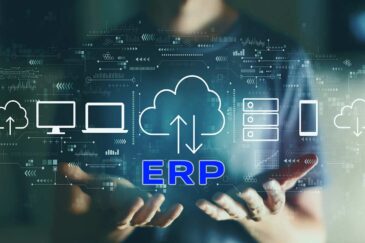10 Benefits of ERP for Accounting and Financial Management

- October 10, 2023
- Jhansi Rani
- 0
- General Ledger: Manage financial transactions, records, and charts of accounts.
- Accounts Payable: Handle vendor invoices, payments, and expense tracking.
- Accounts Receivable: Manage customer invoices, billing, and revenue.
- Cash Management: Monitor cash flow, bank reconciliations, and treasury management.
- Financial Reporting and Analysis: Generate financial statements and perform budgeting, forecasting, and financial analysis.
- Fixed Assets Management: Track and manage fixed assets, such as property, equipment, and depreciation.
- Tax Management: Manage tax compliance and reporting.
- Audit and Compliance: Ensure adherence to financial regulations and support the auditing processes.
1. Streamlined Financial Processes
ERP systems streamline financial processes by consolidating various functions into a single integrated platform. For example, when an organization receives a purchase order, the ERP system can automatically generate corresponding entries in the general ledger, update accounts payable, and track inventory changes simultaneously. This automation minimizes the need for manual data entry, minimizes the chances of errors, and accelerates transaction processing. Additionally, it simplifies financial workflows, making it easier for finance professionals to efficiently manage tasks like invoice processing, expense tracking, and financial reconciliations.
2. Real-Time Visibility
ERP for accounting and finance offers real-time visibility into financial data, allowing stakeholders to access up-to-the-minute information on an organization’s financial health. This visibility extends to various financial metrics, including cash balances, revenue, expenses, and budget variances. With this data readily available, executives, managers, and finance teams can make informed decisions swiftly, respond to market changes promptly, and adapt strategies as needed. This real-time insight is invaluable for strategic planning and operational control, enabling organizations to maintain a competitive edge.
3. Lower Costs
ERP systems automate many financial processes, reducing the need for manual labor and paperwork. This not only saves time but also cuts down on labor costs. Additionally, digitizing financial records reduces the expenses associated with printing, storage, and physical document management. Moreover, ERP systems enhance cost control by providing tools to monitor and analyze expenses, identify cost-saving opportunities, and optimize resource allocation.
4. Improved Accuracy
ERP for accounting and finance reduces the risk of human error in data entry and calculation, which is critical for maintaining accurate financial records. Inaccurate financial data can lead to compliance issues, financial mismanagement, and costly mistakes. ERP systems enforce consistency in accounting practices, ensuring that transactions follow predefined rules and standards. This accuracy supports compliance with financial regulations and builds trust among stakeholders, such as investors, auditors, and regulatory bodies.
5. Enhanced Reporting
ERP systems offer enhanced reporting capabilities by providing finance professionals with powerful tools to generate various financial reports and analyses. These reporting features allow organizations to create customized financial statements, performance dashboards, and ad-hoc reports tailored to their needs. With access to a comprehensive and accurate dataset, finance teams can extract valuable insights into an organization’s financial performance, identify trends, and make data-driven decisions. This capability is essential for understanding profitability, assessing the organization’s financial health, and demonstrating transparency to stakeholders, including shareholders, regulatory authorities, and investors.
6. Better Compliance
ERP for accounting and finance includes features and functionalities to ensure better compliance with financial regulations, tax laws, and accounting standards. These systems often incorporate built-in controls and checks that help organizations meet legal and industry-specific requirements. For example, they can automate the calculation of taxes, generate compliance reports, and maintain an audit trail of financial transactions. This minimizes the risk of errors and non-compliance, helping organizations avoid penalties, fines, and legal issues while maintaining the accuracy and integrity of financial data.
7. Faster Financial Close
ERP systems streamline the financial close by automating critical tasks in period-end and year-end closings, including reconciling accounts, posting journal entries, and consolidating financial data across multiple entities or subsidiaries. As a result, organizations can significantly reduce the time and effort required to complete financial closings. Faster financial closures mean businesses can report their financial results more quickly, meet reporting deadlines, and provide timely financial information to stakeholders, including investors, analysts, and regulatory authorities.
8. Improved Cash Flow Management
ERP for accounting and finance includes robust cash management modules that provide organizations with a clearer understanding of their cash positions, cash flows, and liquidity forecasts. These modules allow finance professionals to monitor cash inflows and outflows, analyze historical cash data, and project future cash requirements. With real-time insights into their cash flow, organizations can optimize working capital, manage funds more effectively, and make informed decisions about investments, debt management, and expense prioritization. This proactive cash flow management helps businesses maintain financial stability and ensure they have the necessary funds to meet their obligations and growth initiatives.
9. Enhanced Decision Support
ERP systems provide enhanced decision support by offering real-time data and robust analytics tools for financial professionals and decision-makers. With access to a centralized database of accurate financial information, organizations can conduct in-depth financial analysis, assess profitability across various business segments, and make informed strategic decisions. These systems allow for scenario modeling, budgeting, and forecasting, enabling organizations to evaluate the potential impact of different financial strategies and market conditions. By utilizing historical and current financial data, ERP systems empower businesses to allocate resources effectively, identify growth opportunities, and mitigate financial risks, ultimately supporting sound decision-making processes.
10. Scalability
ERP systems can adapt as businesses expand to handle increased data volume, complexity, and additional users. This scalability ensures that organizations can continue using their ERP systems as they grow, avoiding investing in entirely new financial management solutions. Whether an organization expands its operations, adds new product lines, or acquires subsidiaries, an ERP system can flexibly accommodate these changes, making it a valuable asset in supporting long-term growth objectives and maintaining financial control and efficiency. This adaptability also allows organizations to scale down if necessary, providing flexibility in growth and contraction scenarios.
ERP Implementation Consulting Services

Services
Products
Company
Copyright © 2025 Rite Software Solutions & Services LLC. All rights reserved.



